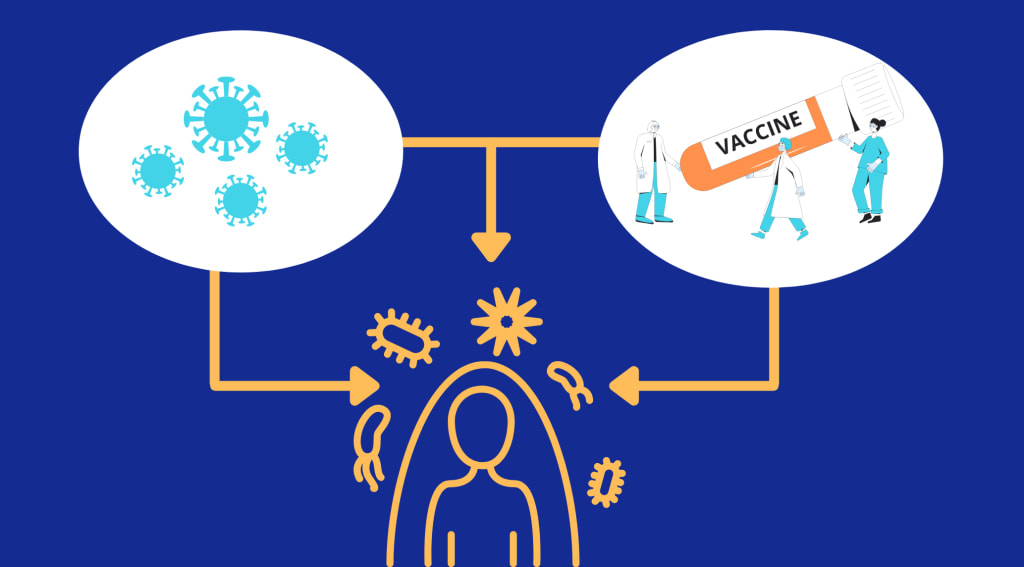Vaccine VS Natural Immunity
health information

Vaccines vs natural immunity: One interpretation of "vaccine vs nature" is a comparison of the protection provided by vaccines versus the protection provided by natural immunity. Vaccines work by exposing the body to a small, harmless piece of a virus or bacteria, which triggers an immune response and helps the body recognize and fight the pathogen in the future. Natural immunity, on the other hand, occurs when the body is exposed to a pathogen and develops an immune response on its own. While both vaccines and natural immunity can provide protection against infectious diseases, vaccines can often provide more reliable and longer-lasting protection. Additionally, vaccines can prevent the spread of disease, which can be particularly important for diseases that are highly contagious.
Vaccines and human intervention in natural systems: Another interpretation of "vaccine vs nature" is a comparison of the role of vaccines in preventing diseases versus the impact of human intervention in natural systems. Many infectious diseases are zoonotic, meaning they are transmitted between animals and humans. Human activity, such as deforestation, habitat destruction, and wildlife trade, can increase the risk of zoonotic disease outbreaks. Some argue that by developing vaccines to prevent these diseases, humans are simply treating the symptoms of the problem rather than addressing the root causes. Others argue that vaccines are a necessary tool for preventing the spread of infectious diseases and reducing the risk of pandemics.
Vaccines and ethical considerations: Another aspect of "vaccine vs nature" is the ethical considerations around vaccine development, distribution, and use. Some people may argue that vaccines are an unnatural intervention in the human body, and that individuals should be allowed to make their own decisions about whether or not to receive them. Others may argue that vaccines are a social good and that individuals have a responsibility to protect themselves and their communities by getting vaccinated. Additionally, there may be questions around access to vaccines, particularly in low-income countries or marginalized communities, and concerns around the distribution of resources and power in the global vaccine landscape.
Alternative medicine and natural remedies: Some people may argue that natural remedies or alternative medicine can be used to prevent or treat diseases without relying on vaccines. For example, some may promote the use of herbal remedies, homeopathy, or other natural treatments. However, many of these treatments have not been scientifically proven to be effective, and in some cases, they may even be harmful.
Public perception and trust in vaccines: Another important aspect of "vaccine vs nature" is the public perception of vaccines and how this influences their use. Vaccine hesitancy and refusal can be fueled by a variety of factors, including misinformation, conspiracy theories, cultural or religious beliefs, and lack of trust in institutions or the medical establishment. This can have significant consequences for public health, as outbreaks of preventable diseases can occur when vaccination rates are low.
Environmental impact of vaccine production: The production of vaccines, like any industrial process, can have an impact on the environment. For example, the use of animal products in some vaccines may contribute to deforestation or habitat destruction. Additionally, the energy required to manufacture, transport, and store vaccines can contribute to greenhouse gas emissions. However, many vaccine manufacturers are working to reduce their environmental impact through sustainable practices and innovations.
Intersection with other global challenges: Finally, "vaccine vs nature" intersects with many other global challenges, including climate change, biodiversity loss, and social inequality. For example, the COVID-19 pandemic has highlighted how health crises can disproportionately affect marginalized communities and exacerbate existing inequities. Addressing these challenges will require a holistic and collaborative approach that considers the interconnectedness of these issues.
Overall, "vaccine vs nature" is a complex and multifaceted topic that involves considerations around science, public health, ethics, and environmental sustainability.





Comments
Mal Regurgitate is not accepting comments at the moment
Want to show your support? Send them a one-off tip.